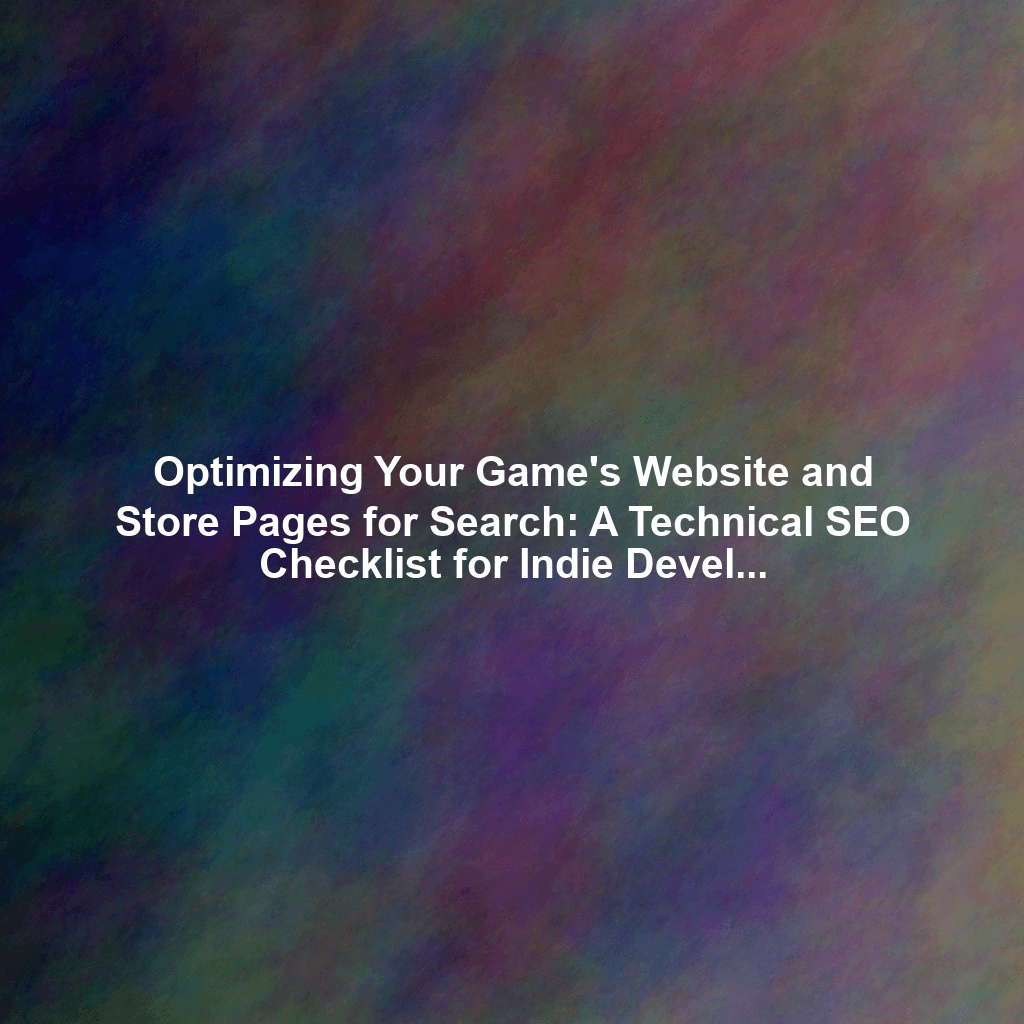The Importance of Technical SEO for Indie Games
Technical SEO focuses on optimizing the behind-the-scenes aspects of your website to make it search engine-friendly. Think of it as building a solid foundation before you start decorating. Without a strong technical base, even the most compelling content might struggle to rank well. For indie games, this means:
- Improved Crawlability & Indexing: Search engines can easily access and understand your content.
- Higher Organic Rankings: Your game shows up higher in search results for relevant keywords.
- Increased Click-Through Rate (CTR): Compelling search snippets entice users to click through to your site or store page.
- Better User Experience (UX): A faster, mobile-friendly website keeps users engaged.
Technical SEO Checklist for Indie Game Websites and Store Pages
This checklist outlines key technical SEO practices you should implement for your game’s website and store pages. Remember that SEO is an ongoing process, so regularly review and update your strategies.
1. Schema Markup for Games
Schema markup is structured data that helps search engines understand the context of your content. Implementing game-specific schema markup provides detailed information about your game, like genre, platform, release date, and reviews, directly in search results. This rich snippet makes your listing more appealing and informative.
- Use the “Game” schema type: Identify your page as being about a video game.
- Include relevant properties: Add details like
name,description,genre,operatingSystem,releaseDate,offers(price, availability), andaggregateRating(if available). - Test your markup: Use Google’s Rich Results Test to validate your schema implementation.
Example (simplified):
<script type="application/ld+json">
{
"@context": "https://schema.org",
"@type": "Game",
"name": "My Awesome Indie Game",
"description": "A thrilling adventure game with a unique art style.",
"genre": "Adventure, Indie",
"operatingSystem": "Windows, macOS, Linux",
"releaseDate": "2024-03-15",
"offers": {
"@type": "Offer",
"price": "19.99",
"priceCurrency": "USD",
"availability": "https://schema.org/InStock"
}
}
</script>
2. Mobile Optimization
A significant portion of internet users browse on mobile devices. Google prioritizes mobile-first indexing, meaning it primarily uses the mobile version of your site for indexing and ranking. Ensure your website and store pages are fully responsive and provide a seamless experience on all devices.
- Responsive design: Use a responsive design framework that adapts to different screen sizes.
- Mobile-friendly testing: Use Google’s Mobile-Friendly Test to identify and fix any mobile usability issues.
- Optimize images for mobile: Compress images to reduce file size and improve loading speed on mobile devices.
3. Page Speed Improvements
Page speed is a crucial ranking factor and significantly impacts user experience. Slow loading times can lead to higher bounce rates and lower engagement. Optimize your website and store pages for speed.
- Optimize images: Compress images without sacrificing quality using tools like TinyPNG or ImageOptim.
- Leverage browser caching: Enable browser caching to store static assets (images, CSS, JavaScript) in the user’s browser for faster loading on subsequent visits.
- Minify CSS and JavaScript: Remove unnecessary characters from your CSS and JavaScript files to reduce their size.
- Use a Content Delivery Network (CDN): Distribute your website’s content across multiple servers to improve loading speed for users in different geographical locations.
4. Internal Linking Strategy
Internal links connect different pages on your website and help search engines understand the structure and hierarchy of your content. Use internal links strategically to guide users to relevant information and distribute link juice throughout your site.
- Link to key pages: Include internal links to your game’s trailer, screenshots, press kit, and store pages.
- Use relevant anchor text: Use descriptive and keyword-rich anchor text for your internal links. For example, link to your Steam page with anchor text like “Buy My Awesome Indie Game on Steam.”
- Create a sitemap: A sitemap helps search engines crawl and index your website more efficiently. Submit your sitemap to Google Search Console.
5. Optimizing Meta Descriptions and Title Tags
Meta descriptions and title tags are HTML elements that summarize the content of your page in search results. They are crucial for attracting clicks and improving your click-through rate (CTR).
- Write compelling title tags: Keep title tags concise (under 60 characters) and include your target keywords. For example: “My Awesome Indie Game | Adventure | Steam, Itch.io”
- Craft persuasive meta descriptions: Write compelling meta descriptions (under 160 characters) that accurately describe your game and entice users to click. Highlight key features and benefits.
- Use unique meta descriptions and title tags: Avoid duplicate meta descriptions and title tags on different pages.
6. Optimize Store Pages (Steam, Itch.io, etc.)
While you have less control over the technical aspects of platforms like Steam and Itch.io, you can still optimize your store pages for search within their respective platforms.
- Utilize relevant keywords: Research and incorporate relevant keywords into your game’s title, description, tags, and features list.
- Create engaging descriptions: Write compelling and informative descriptions that highlight the unique aspects of your game.
- Upload high-quality assets: Use high-resolution screenshots, trailers, and promotional materials.
Conclusion
Technical SEO is an essential component of any successful indie game marketing strategy. By implementing the practices outlined in this checklist, you can significantly improve your game’s visibility in search results, attract more potential players, and build hype leading up to launch. Remember to regularly monitor your website’s performance using tools like Google Search Console and Google Analytics to identify areas for improvement and refine your SEO strategy over time. Good luck, and may your game find its audience!
 Skip to content
Skip to content